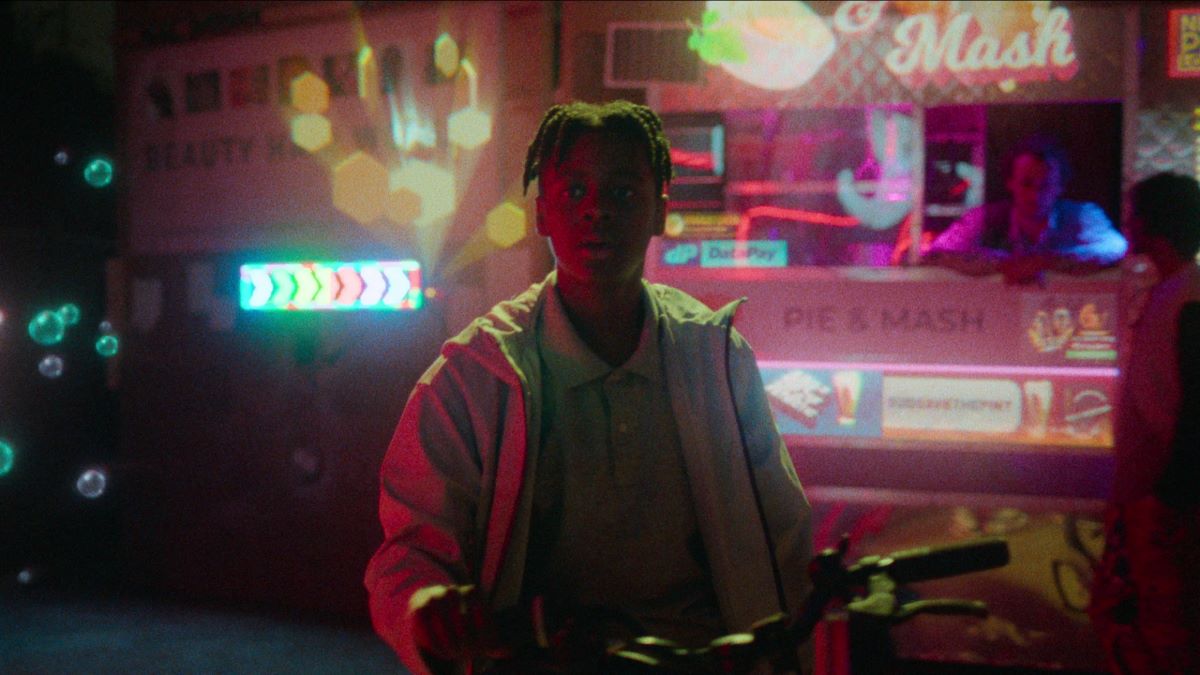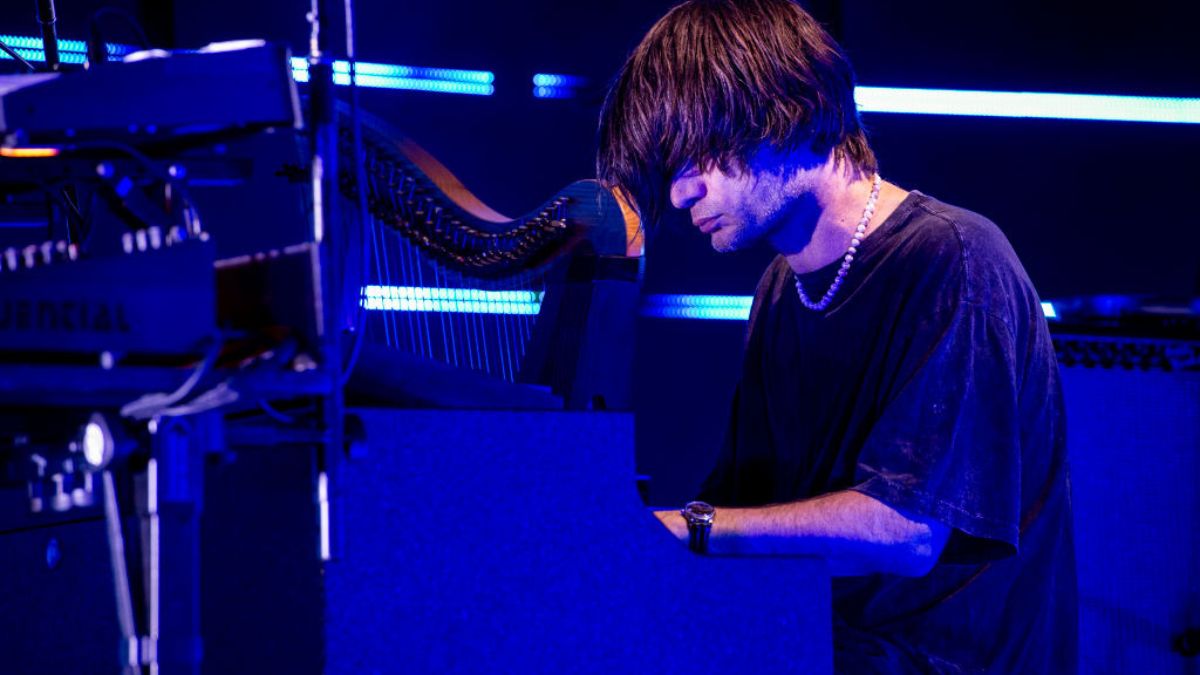Even if The Kitchen — the feature-length directorial debut from Daniel Kaluuya and Kibwe Tavares — will likely leave more than a small handful of itches unscratched, the Netflix sci-fi drama nevertheless marks a hearty win for cinema as a whole. Indeed, we all knew that Kaluuya, in particular, is the cream of the crop in front of the camera, but The Kitchen makes a strong case for the actor’s talent in the director’s chair as well, even if the final outcome of this first venture isn’t quite as magnetic as most may want.
The film’s title gets its name from the chief setting; a small community known as the Kitchen on the outskirts of a futuristic, dystopian London where all social housing has been eliminated, and where the residents fight tooth and nail to keep their homes away from the clutches of the United Kingdom’s police state.
It’s hardly a minute into the film when we first hear the voice of Lord Kitchener — portrayed by former professional footballer and current radio personality Ian Wright, who’s clearly having the time of his life — the host of Kitchen Radio, who far too candidly lets the residents know that the Kitchen’s water supply has been cut off; an event that we later find out was step one in a violent police operation.
In the same breath, we’re introduced to Kane Robinson’s protagonist Izi, a seemingly apathetic funeral home worker and resident of the Kitchen who’s eager to leave it behind for the cozier, more satiating spaces of Buena Vida; at least, that’s what he’d like everyone to believe.
His reluctance to leave the Kitchen comes to a front when he happens upon a young boy named Benji (newcomer Jedaiah Bannerman), who’s in the middle of mourning his recently deceased mother when he notices Izi lingering a bit too long at the chapel.
Both Robinson and Bannerman give it their all, but their characters boast the curious quality (I struggle to call it a problem; more on that later) of not really being written in service to themselves. Indeed, the largely unearned, cyclical moments of bonding, betrayal, and anger between the two is only compounded by a very blatantly telegraphed truth at the outset that causes the seeds of drama to fizzle out before they even have a chance to simmer.
As a result, both actors are left with very little room to really play with their characters in any significant way (an especially unfortunate turn of events for Bannerman, who could have certainly done with more freedom as a young actor in a debut, starring role), and, while the mellow characterization was ultimately just a casualty of The Kitchen‘s reigning creative priority, it will undoubtedly be a turn-off for some.
The creative priority in question, meanwhile, is The Kitchen‘s commitment to being a uniquely celebratory ode to the beauty of interdependence, and the film is undoubtedly at its best when it’s embracing that as loudly as possible, whether that’s with a neon roller rink, some candid street performers, something more intimate like a single father’s commitment to his daughter, or something a touch more macro, like the unspoken systems the residents have in place for combating the military police; it’s made all the better by the film’s punchy infusion of Black British culture, and refreshingly minimalist approach to sci-fi set designs. Without a doubt, The Kitchen‘s style is the substance in most of the best ways.
Even beyond that, Lord Kitchener’s aforementioned opening monologue, in which he informs the residents of the cutting of their water before launching into birthday shoutouts, makes for the perfect opening scene relative to what Kaluuya and company are aiming to do with The Kitchen; the animated intonation of Lord Kitchener’s information, which remains the same from the water announcement to the birthday ones, is indicative of the distinctly loving, upbeat ties the Kitchen has maintained as they brave onslaught after onslaught from the government. Indeed, a community isn’t just an unfeeling fact of happenstance; it’s a beautiful force of nature that must be seized with a gaggle of tenacious smiles, no matter the situation.
Of course, as a theme, championing interdependence is still a bit one-note, and given that the film’s protagonists do little more than supplement that theme (via Izi’s misguided lone wolf act and Benji’s mostly static journey from orphan to son), The Kitchen only has so much gas in the tank to take it the distance it may or may not have been able to go otherwise.
But that “may or may not” distinction is important; there may be no telling what heights the film might have reached if it had added a few more forks in its thematic road, or given much more attention to the lackluster family drama, but those hypothetical paths feel less like missed opportunities and more like choices that just simply weren’t made, for better or worse. In that regard, The Kitchen seems to really understand what it is, and that’s worth a tip of the hat, even if it means an underwhelming final cut as a result.
Nevertheless, it bears repeating that Tavares and Kaluuya have proven themselves as a directing duo to marvel at, and given that this is their first shot at a feature film, perhaps making their first mark with The Kitchen was a tactical choice; story-wise, The Kitchen sorely lacks ambition, and while its succinct and admirable intention doesn’t entirely make up for that, it did give the directing duo the proper space to get their feet wet in figuring out how they wanted to present the story that was there, and they did a mighty fine job of that throughout. It doesn’t earn The Kitchen any additional points, unfortunately, but it certainly reaffirms the artistic intelligence at play here, and one simply salivates at the thought of what the future holds for these two as they establish themselves as more complete filmmakers.
All in all, The Kitchen is a movie that doesn’t exactly reward patience, but still goes out of its way to show its appreciation for the time you do give it. It probably won’t change how you think about revolution and the many forms it can take, nor will it be scoring any points as a captivating drama, a moving tearjerker, or even a noteworthy iteration on the sci-fi genre. But, it does reaffirm a value that we’d be wise to never take for granted, and especially given the genial personality with which The Kitchen honors the deep-seated importance of that value, you’ll likely at least agree that your patience was well spent.











Published: Jan 19, 2024 05:25 pm